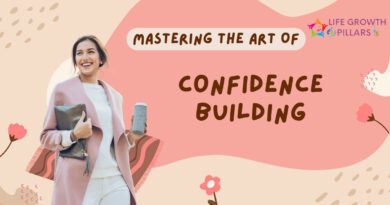Self-Confidence And Self-Esteem Guide | Elevate Your Essence
In a world that constantly demands our attention and approval, cultivating self-confidence and self-esteem becomes a vital journey towards personal empowerment. This guide aims to delve into the intricacies of enhancing your self-worth, providing actionable insights and tips to help you navigate this transformative process.

Understanding The Essence Of Self-Confidence And Self-Esteem
Embarking on the path of self-improvement requires a fundamental understanding of the terms at hand. Self-confidence revolves around believing in your abilities and trusting your judgment, while self-esteem pertains to the overall opinion you have about yourself. These elements serve as the cornerstone of a fulfilling and successful life.
The Interplay Between Self-Confidence And Self-Esteem
Recognizing The Connection
Self-confidence and self-esteem are interconnected, with one influencing the other. When you have confidence in your skills, your self-esteem receives a boost, reinforcing a positive self-image. Conversely, a healthy self-esteem provides a solid foundation for building confidence.
Breaking Down Barriers
Identifying and dismantling barriers that hinder your self-confidence is crucial. Addressing negative thought patterns and challenging self-limiting beliefs are essential steps in nurturing a resilient self-esteem.
Practical Strategies For Boosting Self-Confidence And Self-Esteem
1. Positive Affirmations
Daily affirmations serve as powerful tools to reshape your mindset. Affirming positive traits about yourself can gradually reprogram your thoughts, fostering a more confident and self-assured demeanour.
2. Setting Achievable Goals
Establishing realistic goals creates a roadmap for success. Small victories contribute significantly to building confidence, reinforcing a positive self-image.
3. Embracing Failure as a Stepping Stone
Viewing failure as a learning opportunity rather than a setback is crucial. Embracing mistakes allows you to grow, enhancing both self-confidence and self-esteem.
4. Surrounding Yourself With Positivity
Cultivate a supportive environment by surrounding yourself with uplifting individuals. Positive relationships contribute immensely to bolstering self-esteem.
The Impact Of Self-Confidence And Self-Esteem On Mental Health
Recognizing The Connection
A strong correlation exists between mental health and the levels of self-confidence and self-esteem. Improved self-worth can alleviate symptoms of anxiety and depression, fostering a resilient mind.
Practicing Self-Compassion
Engaging in self-compassion involves treating oneself with kindness during difficult moments. This practice is pivotal in maintaining a healthy mental state, intertwining with elevated self-esteem.
Alleviating Anxiety Through Improved Self-Worth
One notable aspect of this correlation is the alleviation of anxiety. As your self-confidence grows, the grip of anxiety tends to loosen. Positive affirmations and a belief in your capabilities contribute to a calmer, more composed mind.
Depression’s Retreat In The Light Of Enhanced Self-Esteem
Similarly, fostering a healthy level of self-esteem acts as a shield against the shadows of depression. When you hold a positive opinion of yourself, the dark clouds of self-doubt disperse, allowing for a more optimistic outlook on life.

Practicing Self-Compassion: A Pillar Of Mental Well-being
The Essence Of Self-Compassion
In the pursuit of mental well-being, engaging in self-compassion is akin to extending a helping hand to yourself. This practice involves treating oneself with kindness and understanding during challenging moments, fostering a compassionate relationship with your own mind.
Navigating Difficult Moments
Practicing self-compassion becomes pivotal during difficult moments. Instead of succumbing to self-criticism, this approach encourages acknowledging the struggle, understanding that setbacks are a natural part of life, and responding with the same kindness you would offer to a friend.
The Interplay With Elevated Self-Esteem
Self-compassion intertwines seamlessly with elevated self-esteem. When you treat yourself with kindness, your self-esteem receives a positive boost. This harmonious relationship contributes significantly to maintaining a healthy mental state and a resilient mindset.
The Role Of Positive Visualization In Mental Resilience
Crafting A Positive Mental Landscape
Positive visualization emerges as a potent tool in fortifying mental resilience. By visualizing success, you not only enhance self-confidence and self-esteem but also create a mental landscape that is conducive to facing challenges with optimism.
A Shield Against Mental Fatigue
In the face of life’s inevitable challenges, positive visualization acts as a shield against mental fatigue. It provides a mental anchor, reminding you of your capabilities and reinforcing the belief that you can overcome obstacles.
Incorporating Visualization Into Daily Practices
To harness the full potential of positive visualization, incorporate it into your daily practices. Spend a few moments visualizing your goals, achievements, and the person you aspire to become. This consistent effort contributes to a resilient and empowered mindset.
Continuing on this journey of understanding and implementing strategies for enhanced self-confidence and self-esteem not only transforms your perception of self but also becomes a cornerstone for nurturing mental health. The intricate dance between these elements shapes a resilient mind capable of weathering life’s storms with grace and optimism.
Unleashing The Power Of Positive Visualization
Visualizing success and envisioning your goals manifesting can significantly impact your self-confidence and self-esteem. Take time each day to visualize your achievements, reinforcing a positive mindset and building confidence in your abilities.
Nurturing Resilience Through Challenges
Challenges are inevitable in life, and how you navigate them directly influences your self-confidence and self-esteem. Embrace challenges as opportunities for growth, allowing setbacks to fuel your determination and fortify your sense of self-worth.
Building Lasting Confidence In Relationships
Healthy relationships are built on trust and mutual respect, crucial components of both self-confidence and self-esteem. Communication, empathy, and setting boundaries contribute to the development of robust, confidence-boosting connections.
The Role Of Continuous Learning In Personal Growth
Engaging in lifelong learning not only enhances your skills but also plays a pivotal role in nurturing self-confidence. The process of acquiring new knowledge instills a sense of accomplishment, positively impacting your overall self-esteem.

Conclusion
The journey towards enhanced self-confidence and self-esteem is transformative, leading to a more fulfilled and empowered life. By implementing practical strategies, fostering positive thought patterns, and prioritizing mental well-being, you can elevate your essence and navigate life with a newfound sense of assurance. Remember, the key lies in the continuous commitment to your personal growth, and as you embark on this journey, may you discover the true essence of your extraordinary self.
Frequently Asked Questions (FAQs)
Q1. How do self-confidence and self-esteem differ?
A. Self-confidence is specific to believing in your abilities and judgment, while self-esteem is a broader concept encompassing your overall opinion about yourself. While interconnected, they play distinct roles in shaping your mindset and well-being.
Q2. Can positive affirmations genuinely impact self-confidence?
A. Yes, positive affirmations are powerful tools. By consistently affirming positive traits about yourself, you can reshape your mindset, boosting self-confidence and self-esteem over time.
Q3. How can I embrace failure without it affecting my self-esteem?
A. Viewing failure as a learning opportunity is crucial. Embrace mistakes as stepping stones for growth, recognizing that setbacks contribute to the development of both self-confidence and self-esteem.
Q4. What role does a supportive environment play in building self-esteem?
A. Surrounding yourself with positivity and supportive individuals is essential. Positive relationships contribute significantly to bolstering self-esteem, creating a foundation for enhanced confidence.
Q5. How does mental health connect to self-confidence and self-esteem?
A. There’s a strong correlation between mental health and levels of self-confidence and self-esteem. Improving your self-worth can alleviate symptoms of anxiety and depression, fostering a resilient mind.
Q6. How can visualization impact self-confidence?
A. Positive visualization, where you envision success and goal attainment, can significantly impact self-confidence and self-esteem. It reinforces a positive mindset and enhances belief in your abilities.
Q7. Can challenges contribute to building self-confidence?
A. Yes, challenges are opportunities for growth. Embracing challenges and overcoming setbacks positively influences both self-confidence and self-esteem, fortifying your sense of self-worth.
Q8. What’s the connection between continuous learning and self-confidence?
A. Engaging in lifelong learning enhances skills and contributes to self-confidence and self-esteem. The process of acquiring new knowledge instills a sense of accomplishment, positively impacting overall self-worth.
Final Thoughts
The journey toward enhanced self-confidence and self-esteem is a dynamic process. By understanding the interconnected nature of these elements and implementing practical strategies, you can elevate your essence and navigate life with a newfound sense of assurance. Embrace challenges, cultivate positive relationships, and prioritize mental well-being as you continue your path to personal growth. Remember, the ongoing commitment to nurturing your self-confidence and self-esteem is the key to unlocking the true essence of your extraordinary self.



